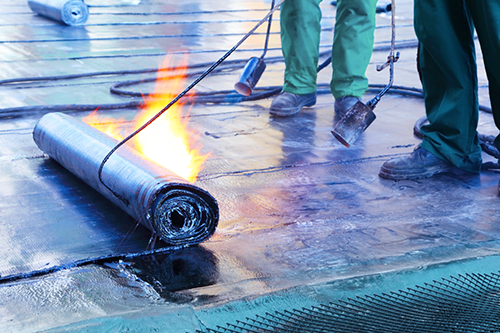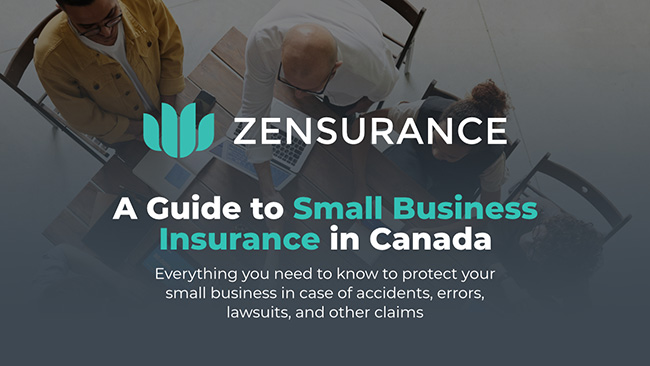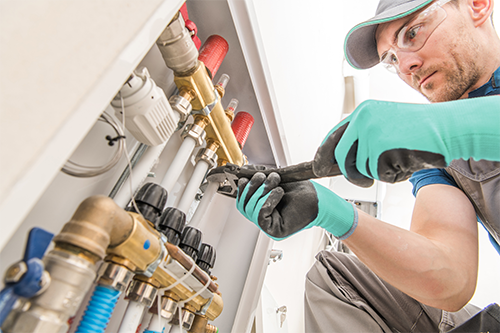Although hot torch roofing is inherently dangerous, it is a practical, energy-efficient option for roofing installations.
Sometimes called torch-on roofing, modified bitumen, or torch down roofing, hot torch roofing involves using a propane torch to heat and bond bitumen sheets to a roof’s surface.
While hot torch roofing offers a strong, weather-resistant option for flat or low-slope roofs when installed by experienced professionals, because of the risks it poses, roofing insurance is essential for protecting a roofer’s finances and their customers’ properties.

Related Posts
Sign Up for ZenMail
"*" indicates required fields
Categories
What Liability Risks Do Hot Torch Roofers Face?
The greatest risk with hot torch roofing is undoubtedly fire.
Using open flame during installation involves torching to temperatures over 1093° Celsius or 2000° Fahrenheit. Accidental fires can occur if roofing materials, insulation, or surrounding structures ignite during torching.
Other significant liability risks hot torch roofers face include the following:
- Third-party property damage claims on customer and neighbouring properties
- Third-party bodily injury claims if customers or passersby are hurt because of your operations
- Injuries to workers, including heat-related illnesses and burns
- Environmental and pollution claims arising from the improper handling of materials, such as asphalt, that pollute soil, water, or the air
- Theft of or vandalism to your tools and equipment
- Regulatory compliance fines or legal actions if you fail to comply with local building codes, safety regulations, and industry standards
5 Tips for Minimizing Hot Torch Roofing Accidents and Damages
To minimize these risks, hot torch roofers must follow safety protocols and have insurance coverage.
Here are five safety tips recommended by the Infrastructure Health and Safety Association for hot torch roofers to follow to prevent accidents, injuries, and damages to property:
1. Wear Personal Protective Equipment (PPE)
Roofers should always wear proper PPE, including Canadian Safety Association-approved hard hats, gloves, eye protection, and boots. Workers should also wear fire-resistant clothing while on site.
2. Only Permit Trained Roofers to Do Hot Torch Roofing
Ensure that workers have been adequately trained to install torch-applied modified bitumen roofing systems, including appropriate training in storing, handling, and using roofing propane. All workers who aren’t torch operators should stay at least 2 metres away from the flame.
3. Inspect the Roof Surface
Check the roof surface for combustible material and debris. Remove or isolate combustible materials to prevent flames from spreading to them. Be extra cautious when torching near pipes, HVAC infrastructure, and air vents and avoid torching near gas and electrical lines.
4. Inspect Torches Before Use
The equipment a roofing team uses should be thoroughly inspected before use. Never use propane equipment that leaks or isn’t in excellent condition. Torch units should be set to their support leg position with the torch head pointing upwards, and never place them on a roof’s edge or leave them unattended. Also, cease torching operations at least three hours before the end of the work day.
5. Appoint a Designated Fire Spotter
Appoint one crew member to be responsible for watching for fires. They should have dry chemical fire extinguishers within 6 metres of each worker using a hot torch, ensure all roofers know where the escape route is if necessary, and inspect the roof for hot spots with an infrared thermometer once work is complete.
In addition to inspecting the roof after work is done, the interior of the building should also be checked for possible hot spots since torching applications may smoulder and burst into flame afterwards.
What Does a Hot Torch Roofing Insurance Policy Include?
A comprehensive hot torch roofing insurance policy typically includes the following types of coverage:
- Commercial General Liability (CGL) Insurance: CGL, or general liability insurance, covers third-party bodily injury and third-party property damage claims arising from your roofing operations. It’s designed to pay for injuries to customers or passersby on job sites, damages to properties caused by your work, and unexpected accidents.
- Tools and Equipment Insurance: Tools and equipment insurance covers repairing or replacing your roofing business’s transportable tools and equipment if stolen, vandalized, or damaged by fire, water, and natural disasters.
- Pollution Liability Insurance: Pollution liability insurance pays for sudden or gradual third-party bodily injuries, third-party property damages, and environmental damages caused by the materials and chemicals used for hot torch roofing applications. It is designed to pay for clean-up costs, emergency response expenses, and civil fines.
Depending on your operations and business needs, there may be other coverages you may need to add to your policy, such as:
- Professional Liability Insurance: Professional liability insurance, or errors and omissions (E&O) insurance, covers roofers who provide consulting and design services for claims of professional negligence, mistakes, inadequate repair jobs, and faulty installations. It can cover your legal fees and settlements or awards to plaintiffs.
- Commercial Auto Insurance: Commercial auto insurance covers your roofing business’s vehicles and trailers. It protects against liabilities such as auto accidents, property damage or bodily injuries to others involving your company-owned or -leased vehicles.
How to Get Low-Cost Hot Torch Roofing Insurance
Zensurance is the best option for contractors and roofing professionals to get low-cost, comprehensive roofing insurance.
Fill out our online application for a free quote.
No matter what your project is – clay roofing, built-up roofing, modified bitumen roofing, rubber membrane roofing, or torch down applications – our knowledgeable brokers can get the coverage you need, customize it to suit your budget, and issue you a certificate of insurance to inspire confidence and trust in your customers.
Related Posts
What Insurance Do Online Sellers Need to Protect Against Customer Lawsuits in Canada?
Consumer lawsuits against Canadian online sellers and e-commerce businesses are common (and expensive). If you sell online – even part-time – it’s vital to understand how to protect your business and finances from customer lawsuits and other liability risks.
What Is Installation Floater Insurance in Canada?
What happens if materials are damaged or stolen before you install them? If you transport or store materials on a job site before installation, installation floater insurance can protect your job profit from theft, damage, or loss anywhere in Canada.
Why Clients Ask for a Certificate of Insurance (COI) in Canada – and How to Get One Fast
Learn what a certificate of insurance (COI) is, why Canadian clients require it, and how small business owners, contractors, and independent professionals in Canada can get a COI fast – often within 24 hours.









